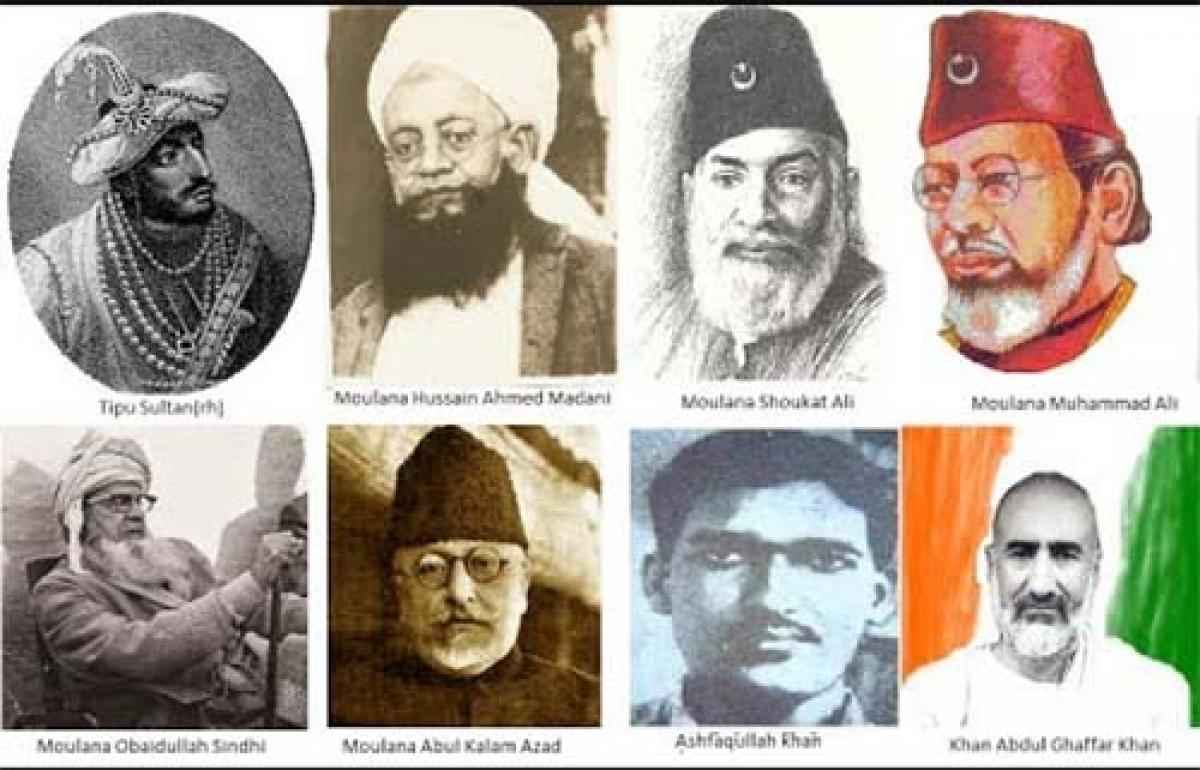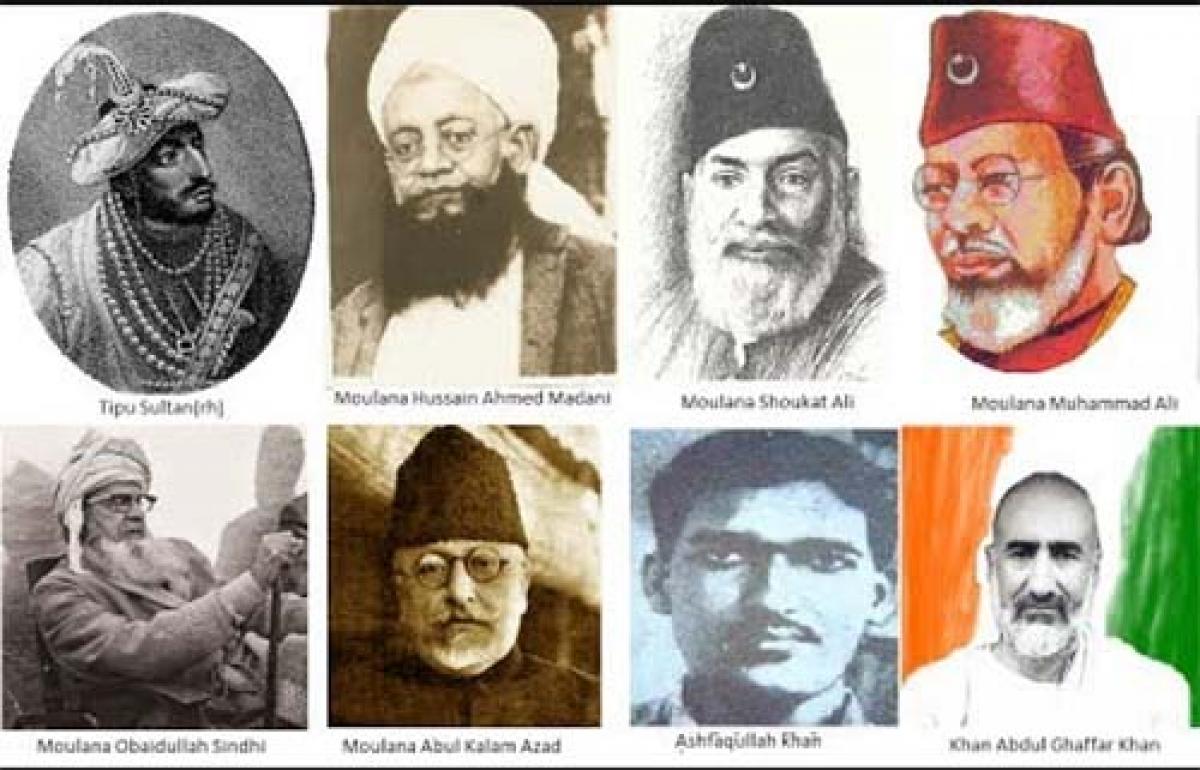Role of Muslims in Freedom Struggle

Role Of Muslims In Freedom Struggle. The Freedom movement of India was not the sole agenda of a particular political party but it had moved aam aadmi in the form of masses in his/her own capacity.
 The Freedom movement of India was not the sole agenda of a particular political party but it had moved aam aadmi in the form of masses in his/her own capacity. The history of Indian national movement would be biased and incomplete without the presentation of the actual role of Indian Muslims in it, right from the revolt of 1857 to the day of Independence in 1947. Shoulder to shoulder they have fought with the other communities for the Independence of India. The contribution of Muslim poets, revolutionaries, and writers is not known today. Instead of secular historiography, it has been communalized.
The Freedom movement of India was not the sole agenda of a particular political party but it had moved aam aadmi in the form of masses in his/her own capacity. The history of Indian national movement would be biased and incomplete without the presentation of the actual role of Indian Muslims in it, right from the revolt of 1857 to the day of Independence in 1947. Shoulder to shoulder they have fought with the other communities for the Independence of India. The contribution of Muslim poets, revolutionaries, and writers is not known today. Instead of secular historiography, it has been communalized.
The Muslims & other minorities never envisaged India as adopted land because Muslims of India have not come from outside but are the converts to Islam and have deep feeling sense belonging to this country and therefore contributed to the cultural,economical, intellectual and spiritual progress through out the ages.
The role,significance & uprising of Indians against British imperialists can be seen since mid of 18th century in the form of Battle of Palashi (Plassey),23rd June 1757. It was Nawab Siraj-ud-Daulah who first awakened Indian rulers and gave a call to oppose the British. He,however, lost the battle and was executed at the young age of 24. This was soon followed by the great Tipu sultan who was slained by Lord Wellesley during the Fourth Anglo-Mysore war in 1799.
The contribution of Muslim revolutionaries can be witnessed from the first half of 19th century. The Faraizi and the Wahhabi Movements had disturbed the pace of British plan in the initial stages of its expansion in India. The Wahabi movement of Syed Ahmed Barelvi was the most organized one. He appealed to all Hindus & Muslims to overthrow the British and thus he was killed in 1831 at Balakot.
The number of Muslims executed only in Delhi during 1857-58 was 27,000. During this revolt, Asghari Begum (mother of Qazi Abdur Rahim, the revolutionary of Thana Bhawan, Muzaffarnagar) fought against the British and was burnt alive when defeated. It was estimated that about 225 Muslim women gave their lives in the revolt.
Similarly, barely is known about the contribution of Muhammad Ashfaq Ullah Khan of Shahjehanpur who conspired and looted the British treasury at Kakori (Lucknow) to cripple the administration and who, when asked for his last will, before execution, desired: "No desire is left except one that some one may put a little soil of my motherland in my winding sheet".
Likewise, the present generation do not know about Khan Abdul Gaffar Khan, a great nationalist who had passed 45 years of his 95 years of life in jail for the freedom of India and thus awarded "Bharat Ratna" in 1987. Barkatullah and Syed Rehmat shah of Ghadar party sacrificed their lives. Umar Subhani, an industrialist and a millionaire of Bombay who,then, presented a blank cheque to Gandhiji for congress expenses and who ultimately sacrificed his life for the cause of independence. Maulana Hasrat Mohani with his poetry infused zeal of freedom in young hearts.
Maulana Abul Kalam Azad, at an age of 35, became the youngest person to serve as thePresident of the Indian National Congress. He was the icon of Hindu-Muslim unity as well as espousing secularism and socialism. Raj Mohan Gandhi in his book "UNDERSTANDING MUSLIM MINDS" mentioned that Maulana went straight to congress office just after the funeral procession of his wife,Zuleikha Begum and led Quit India Movement.
Manmohan Kaur in her book entitled as "Women In India's Freedom Movement" makes reference to only Begum Hazrat Mahel and Bi-Amma out of the hundreds of women who fought the battle of freedom along with their men folk against the British Raj. The history of the Indian national movement would be incomplete without mentioning the heartily services of Abadi Begum (mother of Maulana Muhammad Ali), Amjadi Begum (wife of Maulana Muhammad Ali), Amina Tyabji (wife of Abbas Tyabji), Begum Sakina Luqmani (wife of Dr Luqmani and daughter of Badruddin Tyabji),Nishat-un-Nisa (Begum Hasrat Mohani), Saadat Bano Kitchlew (wife of Dr Saifuddin Kichlew), Zulekha Begum (wife of Maulana Azad), Mehr Taj (daughter of Khan Abdul Ghaffar Khan), Zubaida Begum Daoodi (wife of Shafi Daoodi, the reputed nationalist of Bihar) and many others. Santimoy Ray's "FREEDOM MOVEMENT AND INDIAN MUSLIMS" , challenges the many prejudices that generate bias and hatred against the Indian Muslims, particularly their contentions role in Indian freedom movement.
This shows the great sacrifices they made to oust the British rule in all the national uprisings from Sanyasi Movement to independence, finally led to the withdrawal of British from India in 1947. It is such a pity that their roles in the struggle for freedom has not been adequately presented in the Indian history. The comprehensive study about the role of Muslims struggle for Freedom is essential to help eradicating prejudices and many misconceptions against the Muslims grown in the absence of fair historiography
I'm recalling some of the beautiful lines of Faiz Ahmed Faiz....
Ye daagh daagh ujaalaa, ye shab-gaziida sahar,
Vo intizaar thaa jis-kaa, ye vo sahar to nahiiN,
Ye vo sahar to nahiiN jis-kii aarzu lekar
Chale the yaar ke mil-ja`egi kahiiN na kahiN
Falak ke dasht meN taroN kii aakhiri manzil,
KahiN to hogaa shab-e sust mauj kaa sahil,
KahiN to jaake rukegaa safiina-e-gham-e-dil.
Abhii chiraagh-e-sar-e-rah ko kuchh khabar hii nahiiN;
Abhii giraanii-e-shab meN kamii nahiiN aa'ii,
Najaat-e-diidaa-o-dil ki ghaRii nahiiN aa'ii;
Chale-chalo ke vo manzil abhii nahiiN aa'ii.
Meaning :
This stain-covered daybreak, this night-bitten dawn,
This is not that dawn of which there was expectation;
This is not that dawn with longing for which
The friends set out, (convinced) that somewhere there we met with,
In the desert of the sky, the final destination of the stars!
Somewhere there would be the shore of the sluggish wave of night,
Somewhere would go and halt the boat of the grief of pain.
The lamp beside the road has still come no lessening,
The hour of the deliverance of eye and heart has not arrived.
Come, come on, for that goal has still not arrived.
(Shaik Amer Arafath).














